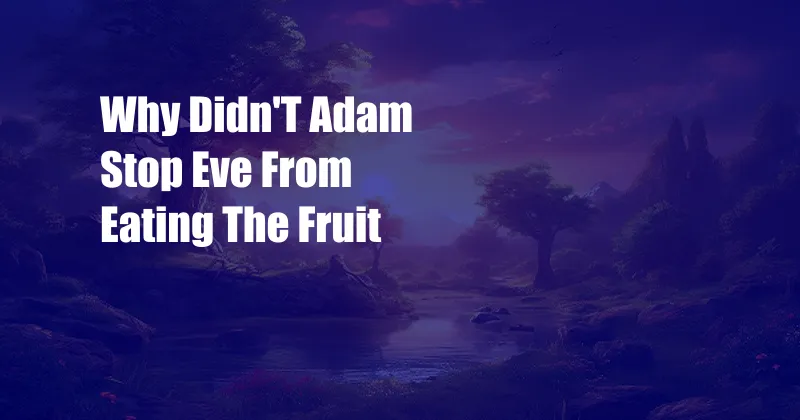
Why Didn’t Adam Stop Eve From Eating the Fruit?
In the captivating biblical narrative of Adam and Eve, a pivotal moment occurs when Eve succumbs to the serpent’s temptation and partakes of the forbidden fruit. The ensuing consequences irrevocably alter the course of human history. However, a lingering question remains: why did Adam, as Eve’s companion, fail to intervene and prevent her fateful decision?
Adam’s Dilemma: Between Knowledge and Obedience
Adam’s initial role:
God had placed Adam in the Garden of Eden with a clear mandate: to cultivate and tend the garden, and to abstain from eating from the Tree of the Knowledge of Good and Evil. Adam bore the primary responsibility for safeguarding the garden and obeying God’s commands.
The arrival of Eve:
With the creation of Eve, Adam gained a companion, but it also introduced a dynamic that would test his resolve. Eve’s inherent curiosity and susceptibility to temptation presented Adam with a new dilemma.
The Serpent’s Seduction and Adam’s Choice
The serpent’s deceit:
The serpent, a cunning creature, preyed on Eve’s desire for knowledge and persuaded her with lies, suggesting that eating the forbidden fruit would unveil hidden wisdom and make her equal to God.
Adam’s knowledge of the commandment:
Adam was fully aware of the commandment from God and the dire consequences of disobedience. However, when Eve approached him with the forbidden fruit, he found himself torn between his love for her and his obligation to obey God.
Adam’s culpability:
Various perspectives exist on Adam’s culpability in this pivotal moment. Some believe that Adam was weak and failed to assert his authority over Eve, while others argue that he allowed his love for her to cloud his judgment. Ultimately, it is up to each individual to interpret this complex and nuanced passage.
The Consequences of Disobedience
Expulsion from Eden:
As punishment for their disobedience, Adam and Eve were expelled from the Garden of Eden, losing their blissful existence and facing the challenges of a hostile world.
The curse of death and toil:
As a further consequence, humans were subjected to the curse of death and the burden of toil and suffering. The once-perfect creation was now tainted with sin and its repercussions.
Lessons Learned from Adam’s Dilemma
The power of temptation:
The story of Adam and Eve serves as a poignant reminder of the allure of temptation and the importance of resisting it. The serpent’s tactics are ever-present in our lives, and it is crucial to be vigilant against their deceptions.
The importance of obedience:
While the serpent’s allure may be tempting, obedience to God’s commands is essential for a righteous and fulfilling life. By honoring God’s will, we align ourselves with his divine purpose and avoid the pitfalls of disobedience.
The challenge of free will:
The story of Adam and Eve also highlights the significance of free will. As humans, we have the power to choose our actions and bear the consequences of those choices.
FAQs on Adam’s Role
Q: Was Adam solely responsible for preventing Eve from eating the fruit?
A: While Adam had a role to play as Eve’s companion, Eve was also an independent agent with the power of choice.
Q: Why didn’t God intervene and stop Eve from tempting Adam?
A: The narrative suggests that God allowed the temptation to occur as a test of their obedience and a means of teaching them the consequences of sin.
Q: Is it possible that Adam did not fully understand the implications of eating the forbidden fruit?
A: The text does not explicitly state Adam’s level of understanding, but it is reasonable to assume that he was aware of the commandment and its potential consequences.
Conclusion
The story of Adam and Eve’s fateful decision to eat the forbidden fruit has left an enduring mark on human history, prompting countless interpretations and debates. While the reasons behind Adam’s inaction may remain a topic of discussion, the lessons learned from their experience continue to guide us today, reminding us of the complexities of temptation, the importance of obedience, and the power of free will.
Are you interested in learning more about the story of Adam and Eve? Share your thoughts and insights in the comments below.